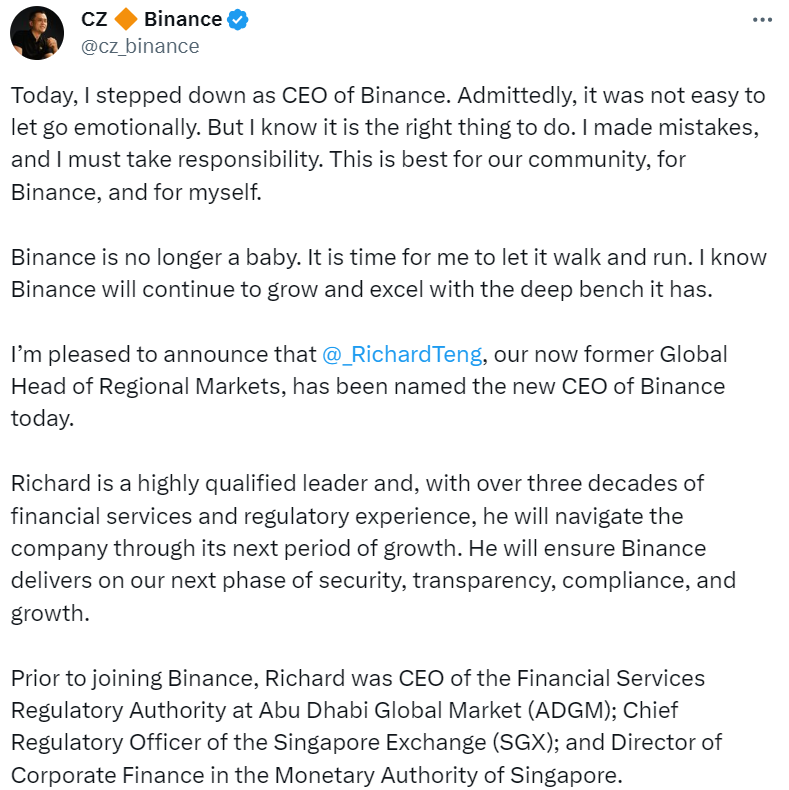
CZ’s exit marks a new chapter for Binance. (Source – Shutterstock).
CZ’s exit marks a new chapter for Binance and the crypto industry
- CZ’s exit and a US$4 billion settlement herald a new, compliance-focused era for Binance and crypto.
- Richard Teng leads Binance into a phase of regulatory adherence and growth in the crypto sector.
- Binance’s recent upheaval and leadership change signify crypto’s closer ties with traditional finance.
Recent news in the tech world has been stirring, especially with two significant events in leadership. Firstly, Sam Altman, CEO of OpenAI, experienced an unexpected twist in his career when he was ousted and then surprisingly rehired. In another significant development, Changpeng “CZ” Zhao stepped down as CEO of the cryptocurrency exchange Binance, following a hefty US$4 billion settlement with US agencies.
Binance Holdings Limited, the company behind the world’s largest cryptocurrency exchange, Binance.com, has admitted guilt and agreed to pay upwards of US$4 billion. This payment resolves the investigation by the Justice Department into several violations, including of the Bank Secrecy Act, unregistered money transmission business activities, and breaches of the International Emergency Economic Powers Act.
Binance’s commitment to anti-money laundering and sanctions compliance
Changpeng Zhao, the founder and CEO of Binance, acknowledged his part in not maintaining an adequate anti-money laundering program, violating the Bank Secrecy Act, and has resigned as Binance’s CEO. The admission of guilt by Binance is a coordinated resolution involving the Treasury Department’s Financial Crimes Enforcement Network and Office of Foreign Assets Control, as well as the US Commodity Futures Trading Commission.
Attorney General Merrick B. Garland commented on the situation, highlighting Binance’s rise to prominence partly due to illegal activities, leading to one of the most significant corporate penalties in US history. He emphasized the recent successful prosecutions of CEOs from two top cryptocurrency exchanges, reinforcing that breaking laws under the guise of innovation still constitutes criminal behavior.
Court documents reveal Zhao’s agreement to a US$50 million fine as part of his plea. Binance’s settlement with the Treasury Department includes a US$3.4 billion civil money penalty and a US$968 million fine related to OFAC. These are record-setting payments for the agencies.
Treasury Secretary Janet L. Yellen criticized Binance for ignoring its legal responsibilities in favor of profit, allowing illicit funds to pass through its platform to terrorists, cybercriminals, and others.
Under the terms of the plea deal, Binance will surrender US$2,510,650,588 and pay a criminal fine of US$1,805,475,575, amounting to a total financial penalty of US$4,316,126,163. Binance is also committed to appointing an independent compliance monitor for three years and improving and rectifying its anti-money laundering and sanctions compliance procedures. Binance negotiated separate agreements with the CFTC, FinCEN, and OFAC. The Department will account for roughly US$1.8 billion of the total financial penalty in these related resolutions.
Navigating new leadership: Richard Teng takes the helm at Binance
In his statement, CZ expressed his emotional difficulty in stepping down, but recognized it as the right decision, accepting responsibility for his mistakes. “I know it is the right thing to do. I made mistakes, and I must take responsibility. This is best for our community, for Binance, and for myself,” CZ said on X.

Binance’s CEO CZ announced his departure and introduced the new CEO of the company. (Source – X)
Richard Teng, previously the global head of regional markets, has assumed the CEO role at Binance. CZ recognized Teng as a competent leader, bringing over thirty years of financial services and regulation expertise to guide the company through its forthcoming development phase.
Before his appointment at Binance, Richard held prominent positions such as CEO at the Financial Services Regulatory Authority of Abu Dhabi Global Market (ADGM), chief regulatory officer at the Singapore Exchange (SGX), and director of corporate finance at the Monetary Authority of Singapore.
What does this mean for Binance and the crypto world?
Like its one-time rival FTX, Binance has emphasized its rapid growth in a tumultuous and largely unregulated sector.
Binance made a statement that while it has flaws, the company had consistently endeavored to safeguard its users from when it was a small startup. Significant investments have been made in enhancing security and compliance measures. The company experienced rapid global growth and admits to making poor decisions during this expansion. Binance is now accepting responsibility for these past actions.
Many cryptocurrency companies echo this sentiment under scrutiny. However, new challenges arise with these changes in leadership and the company’s controversial situation. Stefan Rust, CEO of Truflation, points out that entrepreneurs must work vigorously during the startup phase to make a mark in new markets and attract early adopters.
“This is even harder if your business poses a threat to industry incumbents or has high barriers to entry like financial services, which is mired in legal and political compliance requirements,” Rust added.
In the rapidly evolving US$1.4 trillion cryptocurrency industry, CZ of Binance has been a pioneering figure. Like early internet founders, cryptocurrency is now becoming more integrated into the mainstream market and economic systems, facing full regulation and taxation, with its early pioneers judged retrospectively.

Cryptocurrency is now becoming more integrated into the mainstream market. (Source – Shutterstock)
Rust suggested that Binance likely didn’t comply with all regulations initially, as cryptocurrency was an emerging industry without established rules. He emphasized that disruptive technologies must move quickly, as waiting for regulations could hinder groundbreaking innovations, drawing parallels with the internet, package software, and mobile technology.
“The decentralization of power is ultimately the main reason for the creation of cryptocurrencies, and this further reinforces the need to expand decentralized services, build better user interfaces, and enable more self-custody of funds,” Rust explained.
He also believes jurisdictional arbitrage might become more challenging, although South America is emerging as an attractive hub for the industry, influenced by pro-crypto governments in El Salvador, Venezuela, and Argentina.
Rust commends CZ for building Binance into a company with assets over US$72 billion, emphasizing that despite prioritizing speed, CZ maintained the safety of customer funds. He laments the loss of influential figures like Arthur Hayes of BitMEX and CZ, who he sees as positive forces in the crypto industry.
He views the recent developments as beneficial for the crypto industry, with Binance becoming more legitimate and financially stable. The move is seen as a positive step for the industry, potentially ushering in a new bull market.
Akash Mahendra of Haven1 also commented that this is a pivotal moment for cryptocurrency’s integration with traditional financial systems. He believes it will benefit Binance and its users, but raises concerns about selective enforcement and potential bias in regulatory practices. Despite these challenges, he notes the industry’s resilience and potential for growth.
The action against Binance highlights the complexities and ambiguities in current crypto regulations, possibly deterring new entrants and hindering sector growth. Mahendra emphasizes the need for clearer regulatory frameworks, responsible industry practices, and transparent and compliant solutions in decentralized and centralized finance. He concludes by stressing the importance of regulation-friendly products in DeFi for a healthier and more resilient ecosystem.
READ MORE
- Safer Automation: How Sophic and Firmus Succeeded in Malaysia with MDEC’s Support
- Privilege granted, not gained: Intelligent authorization for enhanced infrastructure productivity
- Low-Code produces the Proof-of-Possibilities
- New Wearables Enable Staff to Work Faster and Safer
- Experts weigh in on Oracle’s departure from adland




